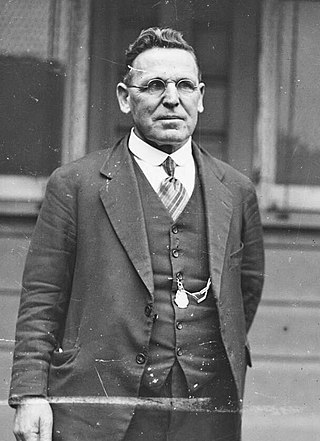
City of Wagga Wagga is a local government area in the Riverina region of southern New South Wales, Australia.

William Francis Schey (1857–1913) was an Australian politician.

Richard Stevenson was an English-born Australian politician.
The 1904 New South Wales state election involved 90 electoral districts returning one member each. The election was conducted on the basis of a simple majority or first-past-the-post voting system. There were two significant changes from the 1901 election, the first was that women were given the right to vote, which saw an increase in the number of enrolled voters from 345,500 in 1901, to 689,490 in 1904. The second was that as a result of the 1903 New South Wales referendum, the number of members of the Legislative Assembly was reduced from 125 to 90. The combined effect of the changes meant that the average number of enrolled voters per electorate went from 2,764, to 7,661, an increase of 277%. Leichhardt was the only district that was not substantially changed, while The Macquarie and The Murray districts retained nothing but the name.
A by-election was held for the New South Wales Legislative Assembly electorate of Bathurst on 25 June 1900 when Protectionist party member Francis Suttor was appointed to the Legislative Council.

The 1895 Canterbury colonial by-election was held on 11 June 1895 to elect the member for Canterbury in the New South Wales Legislative Assembly, following the resignation of Free Trade Party MP Varney Parkes.

The 1915 Clarence state by-election was held on 14 August 1915 to elect the member for Clarence in the New South Wales Legislative Assembly, following the death of Liberal Reform Party MP John McFarlane.
Northumberland, an electoral district of the Legislative Assembly in the Australian state of New South Wales was created in 1859 and abolished in 1913.
A by-election was held for the New South Wales Legislative Assembly electorate of Ashfield on 10 November 1900 because Bernhard Wise (Protectionist) had been appointed to the Legislative Council.

The December 1911 Cobar state by-election was held on 2 December 1911 to elect the member for Cobar in the New South Wales Legislative Assembly, following the death of Labour Party MP Donald Macdonell.

The 1918 Cobar state by-election was held on 11 May 1918 to elect the member for Cobar in the New South Wales Legislative Assembly, following the death of Labor Party MP Charles Fern.

The 1928 Hamilton state by-election was held on 8 September 1928 to elect the member for Hamilton in the New South Wales Legislative Assembly, following the death of Labor Party MP David Murray.

The July 1919 Paddington state by-election was held on 26 July 1919 to elect the member for Paddington in the New South Wales Legislative Assembly, following the death of Labor Party MP Lawrence O'Hara.

The 1896 Waverley colonial by-election was held on 20 February 1896 to elect the member for Waverley in the New South Wales Legislative Assembly, following the death of Free Trade MP Angus Cameron.

The 1898 Narrabri colonial by-election was held on 3 June 1898 to elect the member for Narrabri in the New South Wales Legislative Assembly, following the death of Free Trade MP Charles Collins. The vote was held on the same day as a by-election in Sydney-Fitzroy and a statewide referendum on the subject of federation.

The 1898 Sydney-Fitzroy colonial by-election was held on 3 June 1898 to elect the member for Sydney-Fitzroy in the New South Wales Legislative Assembly, following the death of Independent Free Trade MP John McElhone. The vote was held on the same day as a by-election in Narrabri and a statewide referendum on the subject of federation.
A by-election was held for the New South Wales Legislative Assembly electorate of Redfern on 8 July 1889 because of the death of John Sutherland (Protectionist).
A by-election was held for the New South Wales Legislative Assembly electorate of Wellington on 29 May 1891 because of the death of David Ferguson (Protectionist).
A by-election for the seat of Northumberland in the New South Wales Legislative Assembly was held on 26 May 1884 because of the resignation of Atkinson Tighe due to ill health.
A by-election was held for the New South Wales Legislative Assembly electorate of Northumberland on 30 April 1880 because Thomas Hungerford resigned attend to personal business matters.













